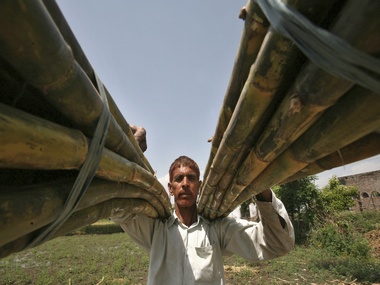The troubles of Mangrul’s farmers have almost entirely to do with sugarcane. The crop has sucked their rapidly-depleting water table dry and mired them in debt. When Firstpost visited this village of 4,000, nearly everyone engaged in agrarian pursuits had invested in sugarcane, and almost all of them were nearing bankruptcy. This ground report, the third in a four part series from Latur and Beed, concerns itself with a region that is almost inextricably tethered to sugarcane. Village elders who had monitored crop and weather patterns change over the decades said growing the crop wasn’t a tenable position for a farmer in Latur: it requires 20,000 litres of water a day, by one conservative estimate; almost ten times that of jowar or soybean. Primitive water conservation methods and erratic rainfall had aggravated circumstances. Santosh Patil’s circumstances were illustrative of Latur’s problems: sustained drought and water-intensive crop had piled on debt; he’d accumulated Rs 20 lakh in the last four years. “In 2013, I borrowed Rs 1 lakh for drip irrigation since sugarcane needs a lot of water. Till today, I’m haven’t recovered the investment amount,” he told Firstpost. Patil tends to a 10 acre tract near Terna river in Mangrul. His yield has decreased from an average of 150 tons to 50 tons. Patil scrambled to adapt, switching to soybean and sorghum, which don’t require as much water, but the rains failed Latur. “I have never faced such a crippling situation in the last two decades. I feel helpless and don’t know what to do,” he told Firstpost when we visited Mangrul in November. Like Patil, Madhav Salegave, who relies heavily on sugarcane, banana and grape, was snared by debt. His losses amounted to Rs 25 lakh, which he lost when sudden hailstorms descended on his 18-acre farm last year. “I have stopped growing sugarcane and banana. Now I’m left only with grapes,” the 40-year-old said. “This year I sowed soybean and sorghum but these too dried up due to lack of rain.” Most farmers in Latur have abandoned sugarcane and have turned to jowar, tur and soybean. In Mangrul, 400 acres were set aside for sugarcane. That number dropped to 50 acres in the years since. But the village is imperilled in far more pressing ways: out of 1,200 acres under cultivation, only 100 are irrigated. Growing any crop, no matter how inclined it is to parsimoniousness, is an onerous task in the village. In November last year, Salegave and a few of his friends attended a one-day workshop in Killari, a village nearby, on water conservation. It was addressed by geologist Suresh Khanapurkar, known for what has come to be termed the ‘Shirpur’ pattern. The scientist was associated with the Groundwater Survey and Development Agency (GSDA); he retired recently, and has carried out construction of small ‘door-less’ concrete dams on nullahs and water conservation schemes in over 60 villages of Shirpur taluka in Dhule district. His work has rendered redundant water tankers in that region and brought almost 80 per cent of land under irrigation. Taken with his project, Salegave and other farmers who attended the workshop determined that they would adapt it to Mangrul’s needs. But they weren’t quite clear how to go about it. In January this year, district collector Pandurang Pole and Pasha Patel, a BJP leader and man of some influence in the region, visited Mangrul to see if Jalayutk Shivar could be tested there. This served to link the famers’ needs with technical expertise and access to resources. Work began in May and was completed by June. De-silting, widening and deepening of the Terna river over a stretch of 3.5 km was carried out. According to sarpanch Balaji Jadhav, the villagers contributed Rs 10 lakh and the state allocated Rs 25 lakh. “We managed to revive Terna, which was completely filled with silt. Though we did not receive much rainfall this year, there is ample water due to the rainfall on the upper side,” said Jadhav. Approximately 800 bore wells and 70 wells in the vicinity were replenished. Mangrul now has over 400 acres under irrigation. “More people have become aware about water conservation methods (after what we did here). They have come up with different ideas of carrying out more such work to make our village drought-free. We plan to widen six small streams now,” said Salegave. Geologist Khanapurkar, though, advises caution. “Though this is a good effort by the state, the approach they have adopted is completely non-technical. Jalayukt Shivar does not provide permanent water for drinking and agriculture. There is no guarantee that the villages won’t need tankers in the future,” he told Firstpost on the phone from Dhule. “Water conservation is a highly specialised undertaking. It is best left to geologists instead of state government officials.” This is an ongoing series on Jalayukt Shivar. Part 1: The nuts and bolts of the scheme Part 2: Widening the Sonvala river in Latur Part 3: How Injegaon’s ‘best farmer’ returned to tilling his land
The troubles of Mangrul’s farmers have almost entirely to do with sugarcane. The crop has sucked their rapidly-depleting water table dry and mired them in debt.
Advertisement
End of Article


)
)
)
)
)
)
)
)
)



